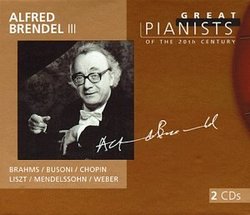| All Artists: Felix [1] Mendelssohn, Carl Maria von Weber, Johannes Brahms, Frederic Chopin, Franz Liszt, Ferruccio Busoni, Claudio Abbado, Bernard Haitink, London Symphony Orchestra, Berlin Philharmonic Chorus, London Philharmonic Orchestra, Alfred Brendel Title: Alfred Brendel 3 Members Wishing: 3 Total Copies: 0 Label: Philips Release Date: 9/14/1999 Genres: Dance & Electronic, Special Interest, Classical Styles: Marches, Chamber Music, Forms & Genres, Concertos, Requiems, Elegies & Tombeau, Short Forms, Historical Periods, Classical (c.1770-1830) Number of Discs: 2 SwapaCD Credits: 2 UPC: 028945673325 |
Search - Felix [1] Mendelssohn, Carl Maria von Weber, Johannes Brahms :: Alfred Brendel 3
 | Felix [1] Mendelssohn, Carl Maria von Weber, Johannes Brahms Alfred Brendel 3 Genres: Dance & Electronic, Special Interest, Classical
Renaissance man Alfred Brendel remains one of the indisputable keyboard giants of the last several decades, and many a music lover has grown up with his Beethoven or Schubert as a point of departure. Though routinely depi... more » |
Larger Image |

 Track Listings (6) - Disc #1
Track Listings (6) - Disc #1